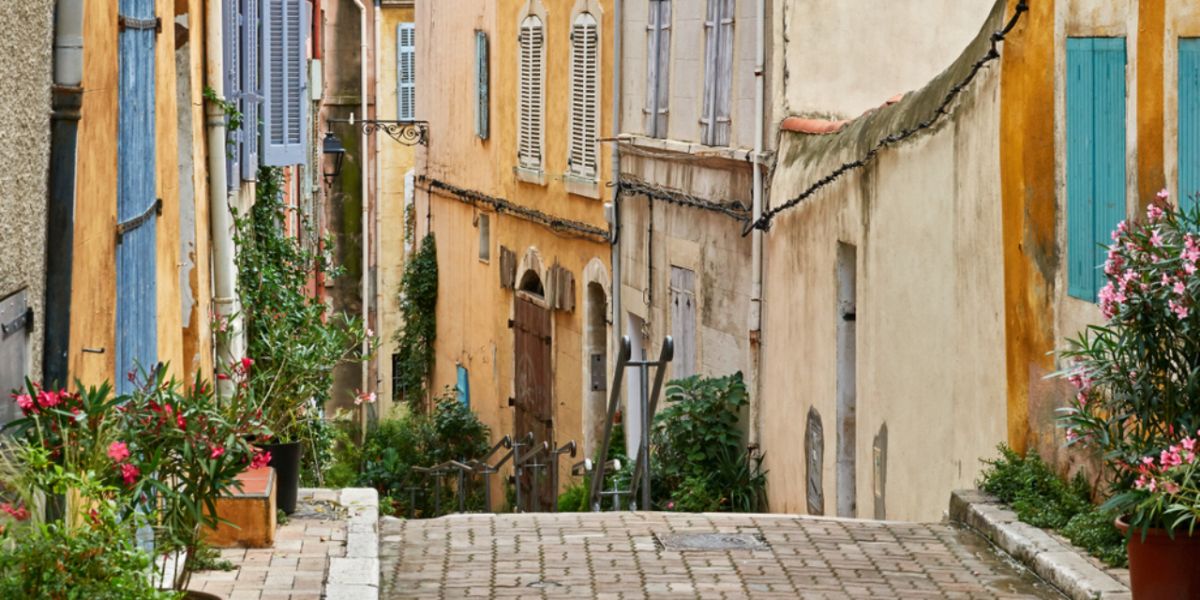
Marseille, also referred to as "la Cité Phocéenne", is situated on the southeastern coast of France. This culturally rich city is currently experiencing significant changes, with substantial investments being made to upgrade its infrastructure. Additionally, for soccer enthusiasts, Marseille is the home of Olympique de Marseille, commonly known as OM among its supporters.
Marseille, a sunny Mediterranean paradise
Marseille, a prominent European city, boasts exceptional sunshine, averaging 2858 hours per year, according to the Marseille Tourist Office. The city is also famous for the "mistral", a cold, winter-like wind.
Marseille comprises 111 official districts, each with its own distinct history and cultivating a unique "village spirit". The city's diverse urban landscape allows for the presence of houses with gardens right in the city center.
Marseille's rich heritage and vibrancy led to its designation as the European Capital of Culture in 2013. This recognition allowed the city to dispel some of the negative associations it had accumulated over the years and showcase its distinctive character, diverse culture, and artistic legacy. Marseille is also renowned for its "Calanques" and its alluring, secluded beaches.
Marseille's neighborhoods
While the city center is heavily urbanized, Marseille's suburbs have a distinctly rural ambiance. The central area and its surroundings feature a blend of small buildings, new residences, as well as old and modern structures.
Marseille spans an area of 240.6 km², with a population density of 3,617 inhabitants per km², making it the second most densely populated city in France.
The city is divided into 16 arrondissements, which are further divided into eight sectors. Within these sectors, there are several unofficial districts. Although these districts are not part of the official list, they hold a special place in the hearts of the locals. Notable examples include the famous Vieux-Port and Les Catalans.
Marseille's arrondissements
1st arrondissement: This is the location of the bustling city center, where apartments offer stunning views of the waterfront. It is also where the Old Port is situated.
2nd arrondissement: Situated north of the Vieux-Port, the 2nd arrondissement is one of the city's most stylish areas. It houses the town hall district and the renowned Vieille Charité, a distinctive multidisciplinary center.
3rd arrondissement: In the central-northern area, the 3rd arrondissement is booming. According to the Observatoire des inégalités, it is the poorest geographical area in France. Nevertheless, the borough's population is growing and modernizing. Similar to the revitalization of the Belle-de-Mai district, the 3rd arrondissement is undergoing a transformation, including the development of a new media library and initiatives promoting biodiversity.
4th arrondissement: Nestled between the 1st and 3rd arrondissements, the 4th is home to the prestigious Palais Longchamp.
5th arrondissement: Located in the center-east of the city, the 5th is highly urbanized and escapes the pressure of tourism.
6th arrondissement: The very chic 6th arrondissement is home to the very bourgeois and bohemian "Cours Julien", an artistic district with festive nightlife.
7th and 8th arrondissements: These are some of Marseille's more well-to-do neighborhoods. The 7th district is particularly appealing due to its residences with sea views. The 8th district is where you'll find the prestigious Vélodrome stadium. While it has been known as the "Orange Vélodrome" since 2016 due to a partnership with the telecommunications company Orange, the name "Stade Vélodrome" still holds a special place in the hearts of soccer fans. Additionally, the 8th arrondissement is renowned for the Prado, an elegant and family-friendly area.
9th arrondissement: This is the city's largest arrondissement. Located southeast of Marseille, it's a residential district that, like the 3rd, is gaining in population. It's best known for its calanques, particularly the postcard-perfect Sormiou.
10th arrondissement: this residential district is home to the Palais Omnisports Marseilles Grand-Est (Pomge).
11th arrondissement: Situated in Marseille's hinterland, the 11th arrondissement is surrounded by hills. It's a diverse district that blends a village atmosphere, tradition, and nature on one side and commercial areas on the other.
12th arrondissement: A large, multi-faceted arrondissement. There are lively neighborhoods like Trois-Lucs, middle-class villas, and hillside hamlets...
13th arrondissement: In the northern districts of Marseille, the 13th arrondissement combines rural neighborhoods, like the picturesque Château-Gombert, with urban areas. Owing to the presence of several universities, the area is known for its vibrant student community.
14th arrondissement: Home to the residential Sainte-Marthe district and the Arnavaux district, famous for its huge market.
15th arrondissement: Home to the Calade district and its Cité Consolat, one of the largest in Marseille.
16th arrondissement: Perched like a jewel box overlooking the sea, the 16th arrondissement is where you'll find l'Estaque, one of the city's cherished treasures. With its enduring "village spirit" and deep-rooted love for its history, the locals proudly uphold l'Estaque as part of their heritage.
Marseille's northern districts include the 13th, 14th, 15th and 16th arrondissements.
Rental prices in Marseille
In the first quarter of 2024, the average rental price per square meter for an apartment in Marseille was 16 euros (with an average low of 11 euros and an average high of 23 euros). However, these figures mask significant variations based on factors such as the arrondissement, district, property type, surface area, and whether it is furnished or unfurnished:
- studio or one-room apartment: approx. 18€/m² unfurnished; 22€/m² furnished;
- two-room apartment: approx. 15€/m² unfurnished or furnished;
- three-room apartment: approx. 13€/m² unfurnished; 14€/m² furnished;
- four-room apartment: approx. 12.7€/m² unfurnished; 13.9€/m² furnished.
For example, renting a one-room apartment in the city center will cost you between €400 and €700 on average. The same apartment in Marseille's northern districts could cost you between €300 and €600 on average. In the city center, a three-bedroom apartment will cost between 800 and 1100 euros. The same apartment in working-class neighborhoods will cost between 700 and 1,000 euros (prices surveyed in the first quarter of 2024). Please note that these figures are estimates and may not reflect your specific situation (area of residence, year of construction, furnishings, etc.).
Cost of living in Marseille
If you're planning to rent in Marseille, it's essential to be aware that condominium fees (for apartments), as well as the costs of water, electricity, and gas, are typically not included in the rent. There are a few exceptions, but you will be informed about these. Currently, the price of condominium charges in Marseille ranges from approximately 9 to 37 euros, depending on the district where you reside.
Eau de Marseille Métropole, the company responsible for managing public water services, has announced its updated rates effective from January 1 to June 30, 2024. The cost for water consumption between 0 and 15m³ will be 1.16 euros per m³. For consumption beyond 15m³, the rate increases to 2.40 euros per m³. Eau de Marseille Métropole offers a simulator to assist you in monitoring your water usage.
In January 2024, EDF electricity rates increased, impacting all cities in France. The monthly subscription now costs 12.44 euros. The available plans include fixed prices for 2 years, support for eco-friendly energy providers, and weekend packages.
For internet subscriptions, you'll find offers ranging from 7 to 40 euros, depending on the type of offer (fiber or mobile package) and the provider.
Public transport in Marseille is managed by the Régie des Transports Métropolitains (RTM). RTM operates a vast network of 93 bus lines, three streetcar lines, and two metro lines. Depending on your situation, you can take out a monthly or annual subscription. Advantages may be granted according to age and/or situation. Below are the prices of monthly passes for public transport in Marseille:
- school children/young people (aged 17–25): 18.30 euros;
- student child (large family): 14.60 euros;
- Metropolitan France student/apprentice: 30 euros;
- student: 18.30 euros;
- Métropole senior: 30 euros;
- senior permanent pass: 20 euros;
- Pass 30 jours pour tous: 49.50 euros.
Looking for accommodation in Marseille
It's a good idea to begin your search for accommodation in Marseille well ahead of your move to France, considering that you will need to sign the lease once you are in France.
Expatriates are advised to consider using a real estate agent, especially if they are not fluent in French. The benefit of engaging these professionals is that you can communicate your requirements, budget, preferred property size, neighborhood, and type of accommodation. The real estate agent will have all the necessary details to assist you in finding a property that meets your needs. There are many agencies throughout the city, but we can mention the following:
Don't hesitate to consult sites such as Le Bon Coin, Se Loger, or Paru Vendu, which contain a wide selection of housing ads from individuals or agencies.
Are you already an expatriate in Marseille? Consider visiting the neighborhoods where you are interested in living to explore properties available for sale or rent. This will allow you to get a feel for the area and decide if it's the right fit for you. Afterward, you can simply reach out to the owner or the real estate agency managing the rental or sale.
Finding student accommodation in Marseille
Marseille is one of France's leading student cities and is very attractive to both French and foreign students. Like all student cities, Marseille suffers from a chronic shortage of student accommodation. In Marseille, the most common types of accommodation used by students are:
- rooms in shared apartments;
- studios;
- apartments;
- student residences or cités universitaires (cités U).
Student residences, known as "cités U", are highly sought after in France as they provide affordable housing for both French and international students. Additionally, their proximity to the city's universities offers a great way to save on transportation expenses. This type of accommodation is subsidized by CROUS, the Centre Régional des Oeuvres Universitaires et Scolaires, a public organization that provides financial aid to students, particularly for housing. In Marseille, CROUS manages over 30 student residences, including Alice Chatenoud, Gaston Berger, Luminy, and others.
Even international students are entitled to apply for university housing. Applications can be submitted through the Mon logement CROUS website. It's recommended to register as early as possible, as there is high demand each academic year. Additionally, the website allows you to track the status of your applications.
In addition to student residences, you can also search for shared apartments and rooms or rooms in private homes at affordable rates. Don't hesitate to search on well-known sites such as :
In Marseille, the average rent for a student apartment (studio) is around 500 euros per month. This rate varies according to the area of residence, type of property, surface area, etc. As a foreign student, you may be eligible for housing assistance.
Short-stay accommodation in Marseille
With its 26 centuries of history, Marseille attracts tourists from around the globe each year, drawn by its unique beauty and rich cultural heritage. Designated as a "Ville d'art et d'histoire" (city of art and history), Marseille is highly regarded for its cosmopolitan and vibrant atmosphere. If you're visiting Marseille for a holiday or for an initial scouting trip before moving there, you will definitely need to arrange accommodation.
As a popular tourist destination, Marseille is well-equipped to accommodate its visitors. It offers a wide range of accommodation options to cater to diverse needs and preferences, including hotels of different categories, bed and breakfasts, boat hotels, villas, vacation homes, and chalets. Youth hostels are also available for young adventurers looking for budget-friendly options.
If you don't know where to look, take a look at the Marseille Tourist Office's selection of hotels. Other offers can be found on classic accommodation websites (Booking, Airbnb, Gîtes de France, Hotel.com, etc.). If you're on a tight budget, don't hesitate to turn to sites like Hostel World or Couchsurfing, which will meet your budget requirements.
Book to get the best prices and make sure accommodation is available. Some periods are busier than others.
Buying a house or apartment in Marseille
Housing in Marseille isn't limited to renting. Purchasing a property is also a significant consideration for those looking to settle in the city.
The cost of purchase will be influenced by factors such as the type of property (apartment, house, villa, etc.), its location, size, year of construction, number of rooms, and other relevant details.
To give you an idea, the current price of a small (one-bedroom) apartment in the city center ranges from 80,000 to over 100,000 euros. A three-bedroom apartment could exceed 200,000 euros. The same studio in more popular areas will cost between 50,000 and 100,000. A three-room apartment will cost between €80,000 and over €200,000.
Foreigners, whether resident or not, European or non-European nationals, can buy property in France, provided they can produce the required documents.
Non-European nationals planning to move to France will require a long-stay visa and a residence permit. Your bank will request supporting documents translated into French, such as your birth certificate, family record book, and details of any other bank accounts. It's worth noting that the bank will also require these documents from European nationals. The only exception is the residence permit, as European citizens do not need one.
In practice, the bank thoroughly reviews the files of non-residents, as they are perceived as being at higher risk due to their geographical distance.
Useful links:
Se Loger
Pages Jaunes – Agences immobilières à Marseille
Marseille
Barnes Marseille
Marignan
Terrasse du Sud
Michel de Chabannes
CROUS
Le Bon Coin
La Carte des Colocs
Immojeunes
Whoomies
Appartager
Studapart
We do our best to provide accurate and up to date information. However, if you have noticed any inaccuracies in this article, please let us know in the comments section below.








